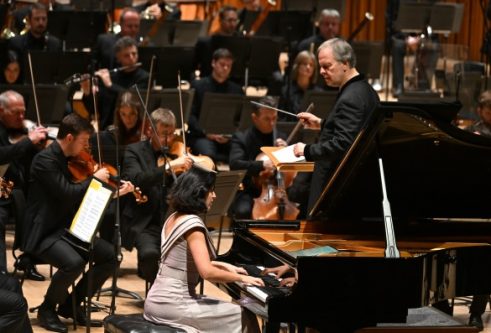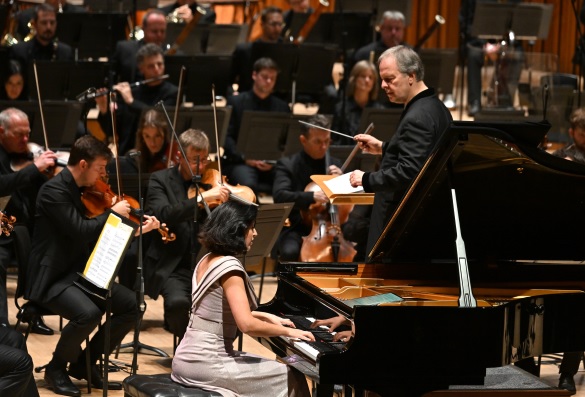 United Kingdom Ligeti, Pejačević, Mahler: Alexandra Dariescu, (piano), BBC Symphony Orchestra / Sakari Oramo (conductor). Barbican Hall, London, 6.10.2023. (CSa)
United Kingdom Ligeti, Pejačević, Mahler: Alexandra Dariescu, (piano), BBC Symphony Orchestra / Sakari Oramo (conductor). Barbican Hall, London, 6.10.2023. (CSa)

Ligeti – Concert Românesc
Dora Pejačević – Phantasie concertante
Mahler – Symphony No.5
In a season dedicated to themes of voyage and storytelling, the BBC Symphony Orchestra, under its principal conductor and skilful guide Sakari Oramo, started their journey deep in the former heartlands of the Austro-Hungarian Empire. The clarity and elegance of Oramo’s conducting style, best described as an iron fist in a velvet glove, imposed tight structure and pinpoint precision on his orchestra while affording his players unshackled artistic freedom. Oramo’s generous and collaborative approach, coupled with his intuitive understanding of the repertoire of twentieth century Mittel Europa released some sparklingly accomplished playing from his band.
The first half of the Barbican concert featured an early work by Geörgy Ligeti, his Concert Românesc or Romanian Concerto. Born to Jewish parents in Transylvania in 1923, Ligeti was sent to a forced labour camp in 1942 and, after the war, joined the faculty of the Franz Liszt Academy in Budapest as a harmony teacher. The concerto was written in 1951, before Ligeti’s escape to the West and his forays into serialism and electronic music. Its folk melodies, dissonant sonorities and lively peasant dance rhythms owe much to the influence of Béla Bartók. A rich sweeping lyricism radiated the opening Andantino, and sprightly high spirits abounded in the csádás-like Allegro, a movement in which small orchestral groups entered into a lively contest to repeat a single folk melody. This seamlessly morphed into delicate Adagio, with sinuous woodwind weaving between two horns, before lurching into the final movement, a riotous, high kicking Romanian folk dance in which a solo fiddle is chased by the full orchestra in what one commentator has likened to an attempt by a fly catcher to swat a mosquito.

Ligeti’s colourful concerto was followed by a somewhat overdue UK premiere of Phantasie concertante, which the infrequently performed Hungarian/Croatian Dora Pejačević composed in 1919. A voluptuously melodic, occasionally turbulent, and unashamedly filmic one movement work for piano and orchestra – perfect for an early Hollywood romantic drama – was reminiscent of Rachmaninov at his most fulsome. Despite a fine virtuoso performance by soloist Alexandra Dariescu and restraint on the part of the orchestra, the piano part was frequently overwhelmed by the orchestral score, and what should have been a balanced conversation between her and the players became more of a competition.
The second half of the journey was devoted to Mahler’s mighty Fifth Symphony. Entirely instrumental, it is a mountainous work which employs huge orchestral forces. As the composer himself said, ‘When I have reached a summit, I leave it with reluctance unless it is to reach for another higher one’. Oramo, one of today’s most authoritative Mahlerians, led his orchestra through the symphony’s precipitous musical terrain with the surefootedness of a seasoned Sherpa.
The first movement, marked Trauermarsch (Funeral March), opened with a baleful bugle call, an ominous presentiment of war, built up to a ferocious passage in which the full forces of the orchestra were unleashed. Blazing but meticulously controlled brass, thundering timpani (a stand-out contribution throughout by Antoine Bedewi) and an artillery of side drums and triangles gave way to a sombre, shuffling march by woodwind and strings. The stormy second movement was faithfully played as Mahler directed, mit grösster Vehemenz (with utmost vehemence) while preserving overall clarity and texture. In some performances, shrieking brass and strident woodwind can be allowed to dominate. Here, Oramo encouraged conspicuously brilliant and vital ensemble playing, but never at the expense of overall balance and cohesion.
Mahler described his Scherzo as ‘primeval – a foaming, roaring, raging sea of sound’ into which he wove a deranged Viennese Ländler. Oramo observed the composer’s intentions to the letter. He maintained a clear and decisive beat in his baton hand throughout, while releasing with his supple and expressive left, a breathtaking, flashing energy from his orchestra. Space was still carefully preserved for some magnificent solos from principal horn Nicholas Korth.
After this tsunami of sound, the fourth movement, Mahler’s love letter to his wife Alma, an exquisitely scored Adagietto for strings and harp. In a performance of heart-breaking beauty, the music floated and eddied as if airborne, and injected a much-needed 10 minutes of calm before the exultant earthy Rondo-Finale burst forth. Brimming with energy, and despite the speed, the playing remained crisp and clean. In short, a magnificent performance which concluded evening of supremely accomplished musicianship, and a great start to the BBC Symphony Orchestra’s season of voyage and storytelling.
Chris Sallon
